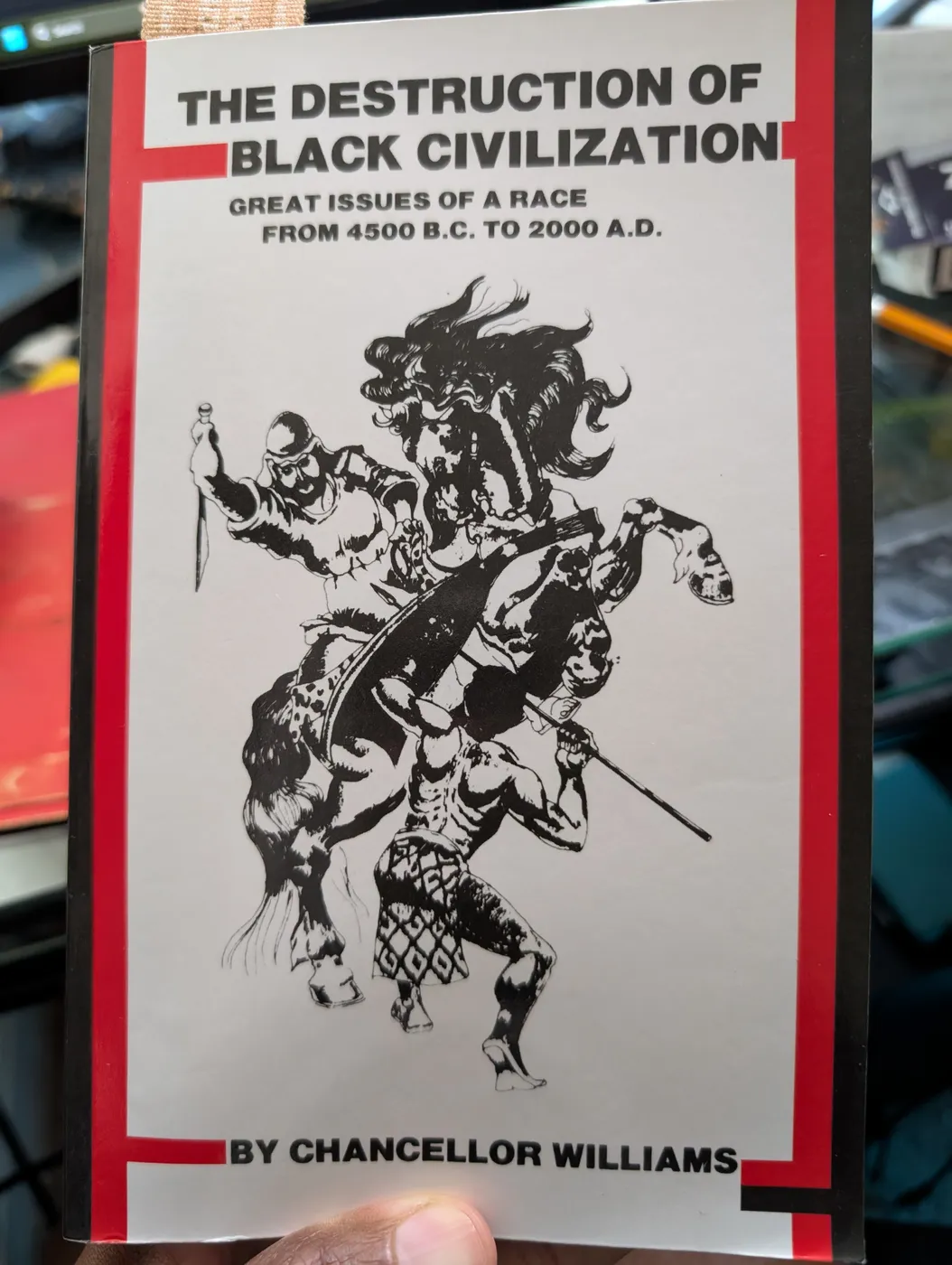Revealing research about the ancient history of black civilization with a focus on Africa, not European colonial views
(Last read: 2020)
Started: 6 Jun 2025
Finished: 20 Jul 2025
Transcript
[Speaker 1]
This is going to be my. My thought download of after finishing my second read of the destruction of black civilization? Um. I don't know if I'm gonna post this because this is probably not a book that most people will be interested in. Um, unless you're black, of course, which, um, probably most people that see me on YouTube are not black, so? Yeah, I'll probably just keep this on the page or something, but
[Speaker 1]
I remember the first time when I read this book for the first time. Five years ago. I didn't believe the stuff that was in it. Because he's talking about the subtitle is great issues of a race from 4 500 BC to 2000 A.D. Because he's talking about these ancient African civilizations that were, you know? Kind of this paradise in Utopia. Before. The beginning of history that well, the beginning of what most people today think of the beginning of History, which is of of civilized history. Which is basically like? Room. Rome tends to be the standard of.
[Speaker 1]
Of the beginning of like Western values and Democratic history, as we know today, but. And I, and I know in school. I don't know what most people got for history, their world history classes, but I remember, like Babylon, Mesopotamia. That's pretty much as far back and the concentration of History, you know, and I get that, you know? Mesopotamia. I was taught. Cradle of civilization. You know, early agriculture, that type of thing? But I never heard anything about Africa. I've never heard anything about that, and then you go further back. You know, they talk about the big periods, the the Ice Age, and all that stuff. But Africa is strangely.
[Speaker 1]
I never remember hearing about. Anything related to Africa. When I was a kid when it comes to world history. And so this book fills in that Gap in a pretty big way. And he goes all the way back to, you know? 4 500 BC, where these ancient African kingdoms? You know they had technology? They had a very organized Society. And his argument. Is his Central argument is? All these things kind of went away because of a lot of different reasons. The way that Africans govern themselves, and of course, foreign incursions. By Outsiders, people looking to exploit Africa for wealth and and just for profit, and that continued.
[Speaker 1]
Um, basically still continues to this day in 2025, it's pretty. Well, to think about that, but? Really for me as a black man.
[Speaker 1]
It's just a part of my history that. That, now that I've read it a second time, it's it's sunk in that. Yeah, this stuff was real. Like, you know, I confirmed it. I've looked it up outside of the book. And this guy, the author Chancellor Williams he spent I don't know. 15, 16 plus years traveling through Africa. This was back in the 1960s. Um, Gathering old records, and so the book is really well researched. And. Essentially, he comes down to the conclusion of, you know, we lack Unity. Um, as as a race. And this is why we've been conquered and exploited for for Generations now for Millennia.
[Speaker 1]
And it's a still big. It's still a big issue. Now, one of the things that really resonated with me still resonates is how? And he bluntly basically says. We trust. White people. We trust non-black people. More than we trust black people. And. I thought about that. And, you know, there's a lot of Truth in that, and I can only speak for myself in this. My experiences throughout my life? But um, I've been around for a while. And I have seen this. I have seen. Um. Other black people when I run into them. There's there's not, and I've talked to other people about this, too. There's not this instant, you know. Let me bring you up, you know?
[Speaker 1]
Most of the time. I'm, I'm tested in some way by other black people. Um, the test comes in various forms. But. It's not usually a friendly encounter, at least not initially, and sometimes it does become, you know, a friendly relationship. But there's always this. Is more than a sniff test. It's like a sniff, and uh, or why don't you go, you know, run around that block and and see, and we gonna see if? If you're worthy to? To be with us, that type of thing, and I experienced this in high school. I experienced this in college.
[Speaker 1]
And even throughout my professional life. It just. I don't know why. It's like this. I don't know why. It's like that, but this book provided some insights into. Just how, from the beginning? We've always as black people, you know, we. We split ourselves up first before. Even why Europeans could come in, um? Arabs could come in before all those people could come in. We were splitting ourselves up, um. And I love how he talks about the African Constitution and kind of the way things were to. Basically, it was written in the African Constitution that. If you were dissatisfied.
[Speaker 1]
With the way your community was running. You could just leave anytime. And go start your own. And I think this is a feature. I mean, I'm sure other. Civilizations and cultures have had this too, but I mean, I just think of Africa today. There are so many subgroups and languages, and you know, you just go over. You know, a couple dozen kilometers, and it's a completely different way of life. It's completely different, so I think I feel like in Africa. It's, it's more extreme than it is in other parts of the world. So, this was one of the early.
[Speaker 1]
Um. Challenges that we faced, and we've kind of continued that tradition I think of. I think of today, you know, I think of my life. Um. Where I've run into black groups, whether it's been in churches or in schools or in professional organizations and. I've just always personally had a hard time just. Just being there in a predominantly black space.
[Speaker 1]
You know, I mean, I'm black, I grew up. I didn't grow up in a black neighborhood and not really a black City, but there were black people around, you know, my, my immediate family, and I had a few friends, but? I've never really. Um. I don't know. I just don't gel well with that. With that space and and some people will say that to be like, oh, you know, you don't care about Black Culture, blah, blah, blah. No, I am black. I'm not trying to not be black. But at the same time. I'm, I just realized that throughout my life, I've had trouble.
[Speaker 1]
Um, relating and connecting to other black black people. Certainly black communities. I can't think outside of, like, my childhood church, where I grew up. I don't think. Voluntarily been a part of a predominantly. Group. That wasn't, like, you know, a classroom or something, which, even then, they weren't. They were never predominantly black, but I've never been a part of those. Of those organizations. I just don't feel welcome, and I see myself doing this too, you know, I have to be honest with myself. That I do see myself when I run into other black people. Kind of doing this.
[Speaker 1]
Doing the same thing they do to me. Which is questioning, you know, are they, you know, are they legit? Are they? Are they a safe bet and some of that is, you know, just my experiences that I've? Um. That I've dealt with, but. Uh, I don't know. So, I'm going to end this. Um.
[Speaker 1]
I'm going to end this, but um. All in all, it's a good read. It is a little bit dated, because in a good way, it's stated actually, because. I think this book was published in like 1975 or mid 70s or something like that. So good, almost 50 years ago, if not 50 years ago. And. The last chapters are him basically laying out a strategic plan to for us to come together as black people and foreign organizations, and to be able to stand in our own two feet, because that's. What he saw, you know, like throughout his research, was that we've always been divided.
[Speaker 1]
We've been divided by by deserts and climate and.
[Speaker 1]
We've divided it by external forces by slavery. By all these different things. But the biggest divider has been just us black people. It's been ourselves. And a lot of that is a legacy from slavery. I don't really like talking about slavery, not because of, like. Oh, it's so traumatic, or you know, it's so terrible, which it is those things, but?
[Speaker 1]
The story's been told, like, everybody knows about slavery. And that we, as black people got. The, the highest evolved form of slavery. You know they were slaves before black slaves, of course, but?
[Speaker 1]
I like to say we got slavery, like version five. We got the the last version of slavery, the most complete form of slavery as a human institution. Um, where it was based. It was already a business by the time black slavery becomes a thing. Um.
[Speaker 1]
By the time black slavery becomes a thing. Um. It's the 16th century or 17th century. Then, you know, there's always there's already been all these iterations of slavery, the whole infrastructure's there. The entire world is hungry for slave labor, and they just have all of these people here who. Already seem uncivilized, who don't really have their stuff together who are divided. Except for very few cases. And it was just too easy. And so, for the next 200, 250 plus years. It's, it's basically predominantly black slavery. And you know, here we are. Only. You know, a good 150 plus years removed. It's not a very long time.
[Speaker 1]
To drop those preconceptions about who we are as a people in the eyes of non-black people. So, I always say after reading something like this, you know, I've I've had the same mentality since I was a kid when it comes to? To race, and it's not something that I talk or write, or honestly, that I think about a lot. But. It's that you know. We have to pull ourselves up. We have to be the one. We can't wait for anybody else to to do it. For us, nobody's going to come and save us. We have to be the ones.
[Speaker 1]
To get ourselves in order, and this is precisely what the book basically what it ends on. And he's very extreme and kind of fire and brimstone when it comes to. His final line, but I think it's a really good final line.
[Speaker 1]
Is is kind of. Charge to us and the responsibility that we have to get our shit together as a race, he says. If we fail to accept this challenge at this critical turning point in our history. We will have proved ourselves Unworthy of having any descendants. And our very names should be forgotten by them. Or cursed by the furthest generation.
[Speaker 1]
Good book.

